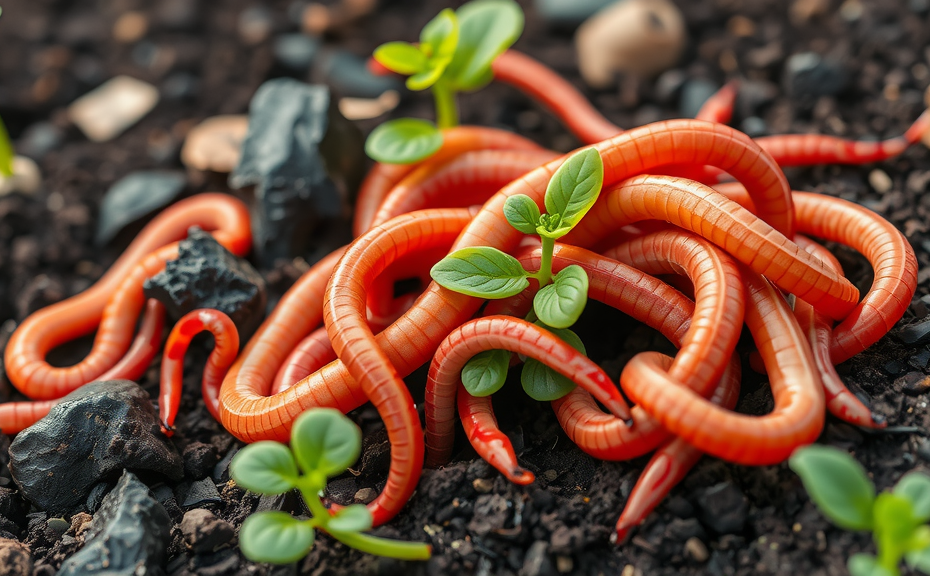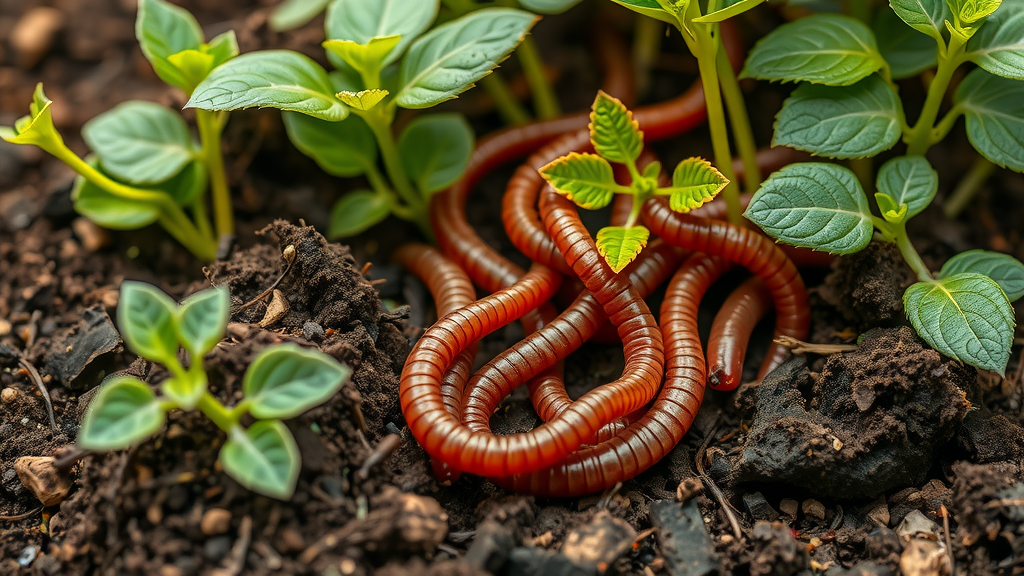Soil health is significantly improved through the actions of specific worm species. These organisms, scientifically classified as Eisenia fetida, serve as a key player in the composting process, transforming organic matter into nutrient-rich humus.
Rather than residing in the soil like traditional earthworms, they prefer decaying materials, which empowers them to efficiently break down waste.
This decomposition accelerates nutrient cycling, allowing plants to absorb essential elements more effectively.
Their burrowing activities create aeration pockets within the substrate, enhancing both water drainage and root development.
These worms boost microbial activity, a cornerstone of a thriving garden ecosystem. Healthy microbial communities play a significant role in soil enrichment, facilitating the breakdown of organic matter, enhancing aeration, and promoting nutrient cycling through composting processes.
Benefits Of Red Wigglers In Gardens
Incorporating specific types of earthworms into gardening practices can significantly improve garden health. The enhancement of soil structure occurs as these creatures aerate the ground through their burrowing, leading to improved drainage and root growth.
They create aggregates that help reduce soil compaction, which ultimately enhances water retention for plants.
Another notable benefit is the boosting of nutrient content.
Vermicomposting allows for the production of worm castings, which are packed with vital nutrients like nitrogen, phosphorus, and potassium.
Research indicates that the application of these castings can significantly improve seed germination rates and enhance the vigor of various plants.
Supporting microbial activity is also imperative for maintaining healthy soil. Red wigglers assist in establishing a diverse microbial population, which facilitates nutrient cycling while breaking down organic matter into bioavailable nutrients. This biodiversity significantly enhances garden health by improving soil structure and fertility through the activity of earthworms and the nutrient-rich worm castings produced during vermicomposting.
How Do Red Wigglers Aid Decomposition
The process of breaking down organic matter relies heavily on the contributions of red wigglers. These organisms thrive in various environments, including compost piles and garden beds, where they play a significant role in aiding decomposition.
When consuming organic waste, they transform it into nutrient-rich natural fertilizer.
Remarkably, these worms can process up to half their body weight in organic material daily, which accelerates decomposition rates.
Their digestive tracts enhance microbial activity, releasing enzymes that further assist in breaking down material. Burrowing through the soil allows for improved moisture retention and oxygen levels, which benefits aerobic decomposers.
The influence of red wigglers on sustainable gardening practices cannot be overstated, as they contribute to healthier ecosystems while enriching the soil.
Red Wigglers
- Red wigglers can process up to half their body weight in organic material daily.
- They enhance microbial activity in their digestive tracts, releasing enzymes that aid decomposition.
- Burrowing through soil improves moisture retention and oxygen levels for aerobic decomposers.
- They contribute to healthier ecosystems and enrich the soil, supporting sustainable gardening practices.
Enhancing Soil Fertility With Worm Castings
Utilizing organic materials can significantly enhance the quality of the earth, providing a rich habitat for various forms of life. Castings produced by worms are particularly beneficial, containing a diverse array of nutrients vital for healthy plant development.
These natural fertilizers boast a high concentration of nitrogen, phosphorus, and potassium, essential for promoting robust growth.
Notably, worm excrement can offer up to seven times more available nitrogen compared to conventional compost, contributing to improved crop yield.
The presence of beneficial microbes within these castings also aids in establishing a healthier environment for plants, effectively outcompeting harmful pathogens. The organic matter found in worm castings plays a significant role in enriching soil structure, which facilitates better aeration and moisture retention.
This enhancement not only supports a thriving ecosystem but leads to healthier plants, ultimately fostering sustainable practices like recycling waste and nurturing the soil.
What Is Vermicomposting And Its Advantages
Utilizing specific worm species for organic waste decomposition offers a unique approach to sustainable gardening. Red wigglers, for example, play a vital role in transforming kitchen scraps and yard debris into nutrient-rich compost, commonly referred to as worm castings.
This form of composting can be up to ten times more effective as a fertilizer compared to traditional methods.
Worm castings not only provide essential nutrients but also boost microbial activity in the soil, promoting a diverse ecosystem.
The advantages for gardeners include enhanced soil fertility, improved pest resistance, and greater water retention. Engaging in this ecofriendly practice not only supports waste reduction efforts but also enriches the environment, aligning with gardening goals to foster healthy plant growth.
Worm Composting
- Red wigglers can decompose kitchen scraps and yard debris effectively, converting them into nutrient-rich worm castings.
- Worm castings can be up to ten times more effective as a fertilizer compared to traditional composting methods.
- This process enhances soil fertility and promotes microbial activity, leading to a healthier ecosystem.
- Utilizing worm composting improves pest resistance and increases water retention in the soil.
Improving Plant Growth Through Soil Aeration
Healthy plant development relies significantly on well-aerated soil, which allows roots to access essential air and nutrients. The activity of earthworms is particularly beneficial in enhancing soil structure.
As these organisms burrow through the earth, they create a network of tunnels that facilitates the movement of air and water, leading to improved conditions for growth.
This process not only promotes the accessibility of nutrients but also fosters the presence of beneficial soil organisms that are crucial for overall soil health.
Worm castings, which are rich in organic matter, further enhance soil porosity and moisture retention.
The presence of these castings contributes to a robust soil ecosystem, encouraging a diverse array of microorganisms that support nutrient cycling. Enhanced aeration allows for better root penetration, which increases the overall resilience of plants. The interconnectedness of soil health and plant vitality underscores the importance of maintaining a healthy ecosystem through practices such as composting, which enriches soil organisms, enhances environmental benefits, and reduces the need for synthetic fertilization in backyard bins.
How Do Red Wigglers Contribute To Nutrient Cycling
The presence of red wigglers significantly enhances soil nutrient cycling through their unique feeding habits and biological processes. These organisms consume decomposing organic materials, such as kitchen scraps and yard waste, and convert them into nutrient-rich castings.
These castings are an important organic amendment, containing vital nutrients like nitrogen, phosphorus, and potassium, which are often more accessible to plants compared to conventional fertilizers.
The activity of red wigglers stimulates microbial populations in the soil, enhancing ecosystem balance and further aiding in nutrient availability.
Increased microbial diversity supports healthy soil dynamics, as beneficial microorganisms break down organic matter, facilitating nutrient absorption for plants. Their burrowing behavior also promotes soil aeration, directly contributing to improved cultivation conditions that support robust plant growth and sustain nutrient cycling. Transitioning from enhancing nutrient availability to implementing sustainable practices in gardening can further leverage the benefits provided by these remarkable worms, promoting ecosystem balance and improving soil fertility through the use of organic amendments in cultivation.
Red Wigglers in Soil Health
- Red wigglers convert organic waste into nutrient-rich castings that enhance soil fertility.
- The castings produced contain essential nutrients like nitrogen, phosphorus, and potassium, which are more accessible to plants than conventional fertilizers.
- Red wigglers stimulate microbial populations in the soil, promoting a balanced ecosystem and improving nutrient availability.
- Their burrowing behavior improves soil aeration, which supports robust plant growth and sustains nutrient cycling.
Sustainable Practices With Red Wigglers In Gardening
Utilizing earthworm species like red wigglers offers innovative solutions for enhancing gardening methods. These organisms contribute significantly to nutrient availability within the soil.
By consuming organic material, they transform it into nutrient-rich compost known as worm castings, which fosters a vibrant soil microbiome.
This unique process enhances the population of beneficial microorganisms, promoting healthier plant growth.
The castings improve soil structure and moisture retention, thereby reducing the frequency of watering. Beyond improving garden care, red wigglers also play a vital role in the carbon cycle; they break down organic waste, thereby minimizing contributions to landfills and promoting eco-friendly gardening practices.
The integration of these worms into gardening routines not only leads to robust plant development but also supports a more sustainable approach to landscaping.
The Role Of Earthworms In Organic Matter Recycling
These remarkable creatures play a significant role in enhancing the health and productivity of soil ecosystems. Through their actions, they aid in the breakdown of organic material, which fosters organic soil health by ensuring efficient processing of decomposing matter.
As they consume organic waste, the resulting nutrient-rich castings contribute directly to soil improvement, providing essential nutrients for plants.
The presence of earthworms also stimulates microbial activity, which further supports the intricate web of life within the soil.
Their burrowing behavior creates pathways for air and water, improving infiltration and overall soil structure. Notably, specific species, such as red wigglers, excel in composting systems, demonstrating a preference for certain environments.
Encouraging these organisms in gardening practices can lead to increased garden productivity, effectively transforming waste into valuable resources for plant growth.
Earthworms in Soil Ecosystems
- Earthworms break down organic material, enhancing soil health and fertility.
- The castings produced by earthworms are nutrient-rich and beneficial for plant growth.
- Earthworm activity stimulates microbial life, supporting the soil’s ecosystem.
- Burrowing behavior of earthworms improves air and water infiltration in the soil.

